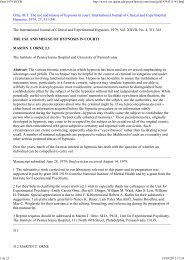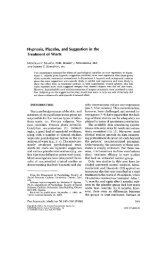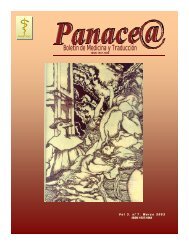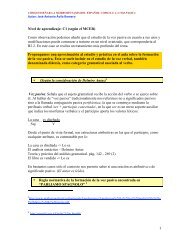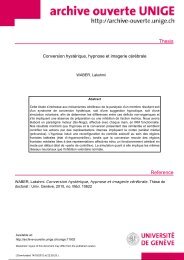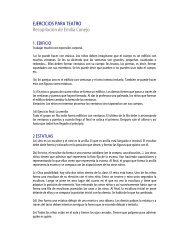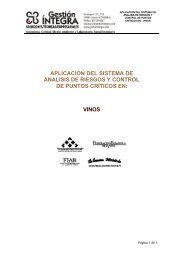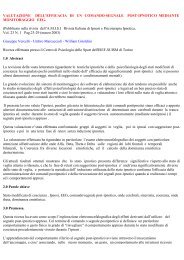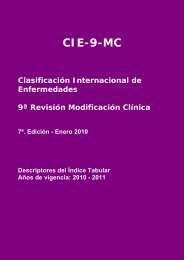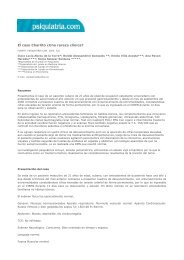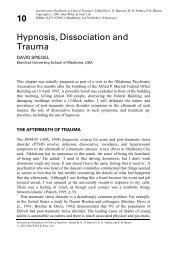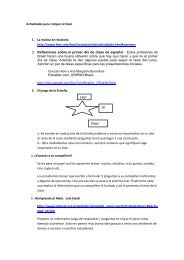Diccionario etimológico comparado de la lengua castellana
Diccionario etimológico comparado de la lengua castellana
Diccionario etimológico comparado de la lengua castellana
You also want an ePaper? Increase the reach of your titles
YUMPU automatically turns print PDFs into web optimized ePapers that Google loves.
:<br />
EXCOR EXCRE 2495<br />
ción <strong>de</strong> <strong>la</strong> Iglesia que con<strong>de</strong>na <strong>la</strong> fal<strong>la</strong> cometida.<br />
8. * LATAE SENTENTIAE. Aquel<strong>la</strong> en que se<br />
incurre en el momento <strong>de</strong> cometer <strong>la</strong> falta<br />
previamente con<strong>de</strong>nada por <strong>la</strong> Iglesia, sin necesidad<br />
<strong>de</strong> imposición personal expresa.<br />
9. * MAYOR.<br />
los sacramentos<br />
Privación activa y pasiva <strong>de</strong><br />
y sufragios comunes <strong>de</strong> los<br />
fieles<br />
Otrosí 8Ó <strong>la</strong> dicha pena <strong>de</strong> excomunión mayor <strong>la</strong>ta<br />
sententiae mandamos, que no se presten ornamentes <strong>de</strong><br />
cualquier Iglesia par» usos seg<strong>la</strong>res y profanos. Synod.<br />
Tol. lib. 3, tít 5, Const. 5.<br />
10. * MENOR. Privación pasiva <strong>de</strong> los sacramentos.<br />
Kxcoria-ción. f.<br />
Cfr. etim. excoriar. Suf. -ción.<br />
SIGN.— Acción y efecto <strong>de</strong> excoriar ó excoriarse<br />
:<br />
Su zumo bebido, restriñe <strong>la</strong> dysentería, y sirve á <strong>la</strong><br />
excoriación <strong>de</strong> ríñones. Lag. Diosc. lib. 4, cap. 130.<br />
Ex-cori-ar. a.<br />
ETIM.-— Del <strong>la</strong>t. ex-cor-i-are, levantar<br />
el cuero por golpe ú otra cosa, <strong>de</strong>sol<strong>la</strong>r;<br />
comp. <strong>de</strong>l pref. ex- (cfr. 2.°), que<br />
significa separación^ apartamiento y<br />
*-cor-i-are <strong>de</strong>riv. <strong>de</strong>l nombre cor-iu-m,<br />
prim. <strong>de</strong> cuero (cfr.). Etimol. significa<br />
separar el cuero <strong>de</strong>, apartarlo. De excoR-i-ARE<br />
se <strong>de</strong>riva también es-col<strong>la</strong>r<br />
y <strong>de</strong> EXCORIAR <strong>de</strong>scien<strong>de</strong> excoria-ción.<br />
Le correspon<strong>de</strong>n: cat. escoriar, escoriarse<br />
y port. excoriar. Cfr. corteza,<br />
CORIÁCEO, etc.<br />
SIGN.—Gastar, arrancar ó corroer el cutis<br />
ó el epitelio, quedando <strong>la</strong> carne <strong>de</strong>scubierta.<br />
Ú. m. c. r.<br />
Excrecencia, f.<br />
Cfr. etim. excrescencia.<br />
SIGN. — Carnosidad ó superfluidad que se<br />
cría en animales y p<strong>la</strong>ntas, alterando su textura<br />
y superficie natural<br />
Porque ayudado <strong>de</strong> algunas pinzas, arranca <strong>la</strong>s excrecencias.<br />
Lag. Diosc. lib. 3, cap. 88.<br />
Excre-ción. f.<br />
Cfr. etim. excretar. Suf. -ción.<br />
SIGN.—Acción y efecto <strong>de</strong> excretar.<br />
Excrement-al. adj.<br />
Cfr. etim. excremento. Suf. -al.<br />
SIGN.—EXCREMENTICIO.<br />
Excrement-ar. n.<br />
Cfr. etim. excremento. Suf. -ar.<br />
SIGN.—Deponer los excrementos :<br />
Estos que son como excrementados, son los qne han<br />
<strong>de</strong> honrar mi historia. Pie. Just. f. 265.<br />
K Excrement-icio, icia. adj.<br />
Cfr. etim. excremento. Suf. -icio.<br />
SIGN.— Perteneciente al excremento.<br />
:<br />
Ex-cre-mento. m.<br />
ETIM. — Del <strong>la</strong>t. ex-cre-men-tum, el<br />
grano que se ha limpiado por medio<br />
<strong>de</strong> <strong>la</strong> criba, excremento; <strong>de</strong>r. <strong>de</strong>l verbo<br />
ex-cer-n-ere, acribar, limpiar, evacuar;<br />
comp. <strong>de</strong>l pref. ex- (cfr. 1.°), <strong>de</strong>, fuera<br />
<strong>de</strong>, y cer-n-ere, cerner, acribar; discernir,<br />
separar, distinguir; juzgar, <strong>de</strong>cretar;<br />
para cuya raíz y sus aplicaciones cfr.<br />
CER-N-ER, a-cor-t-ar y CRIBA. Etimol.<br />
significa lo que se separa <strong>de</strong>, que se<br />
saca fuera <strong>de</strong>. De ex-cer-n-ere formóse<br />
ex-cre-vi, ex-cre-tum (perf. y supino, por<br />
metátesis <strong>de</strong> <strong>la</strong> -r- y supresión <strong>de</strong> <strong>la</strong><br />
nasal) y luego ex-cre-men-tum, por<br />
medio <strong>de</strong>l suf. -men-tum (cfr. -mentó).<br />
De ex-cre-íu-s, -ta,-tum, ( part. pasivo),<br />
acribado, echado, pasado por tamiz,<br />
cernido, separado, apartado, escogido,<br />
<strong>de</strong>scien<strong>de</strong> ex-cre-to (cfr.), primitivo <strong>de</strong><br />
EX-CRE-T-AR y EX-CRE-T-ORIO (cfr. SUf.<br />
-ORio). De EX-CRE-MEN-TO se <strong>de</strong>rivan<br />
EX-CRE-MENT-OSO, ES-CRÉ-MENT-ICIO, EX-<br />
CRE-MEN-T-AL y EX-CRE-MENT-AR . De<br />
ex-cre-tus <strong>de</strong>scien<strong>de</strong> ex-cre-t-io, -ion-is,<br />
-ion-em, prim. <strong>de</strong> ex-cre-ción (cfr.). Le<br />
correspon<strong>de</strong>n : ital. escremento; port.<br />
excremento; franc. excrément ; catalán<br />
excrement ; inglés excrementa etc. Cfr.<br />
ACRIBAR, secreción, DISCRETO, CtC<br />
SIGN.—1. Heces <strong>de</strong>l alimento, que <strong>de</strong>spi<strong>de</strong><br />
el cuerpo por <strong>la</strong> vía á este efecto <strong>de</strong>stinada,<br />
<strong>de</strong>spués <strong>de</strong> hecha <strong>la</strong> digestión :<br />
Miren <strong>de</strong> qué se compone La pompa <strong>de</strong> nn Mayorazgo,<br />
De excrementos <strong>de</strong> animales, Y hierba molida á palos.<br />
Quev. Mus. 6. Rom. 88-<br />
2. Cualquiera materia ó superfluidad inútil<br />
y asquey?osa que <strong>de</strong>spi<strong>de</strong>n <strong>de</strong> sí los cuerpos por<br />
boca, nariz ú otras vías :<br />
Quédanos ahora otro excremento allen<strong>de</strong> <strong>de</strong> los dos<br />
yá dichos, que es <strong>la</strong> aguanosidad <strong>de</strong> lo que se bebe.<br />
Fi . L. Gr. Symb. part. 1. cap. 26-<br />
3. El que se produce en <strong>la</strong>s p<strong>la</strong>ntas por putrefacción,<br />
Excrement-oso, osa. adj.<br />
Cfr. etim. excremento. Suf. -oso.<br />
SIGN.— 1. Aplícase al alimento que, por convertirse<br />
en más excrementos que otro, contribuye<br />
menos á <strong>la</strong> nutrición :<br />
Es <strong>la</strong> carne <strong>de</strong>l ánsar dura y excrementosa, mas qne<br />
ninguna <strong>de</strong> <strong>la</strong>s ayes caseras. Huert. Plin. lib. 10,<br />
cap. 22.<br />
2. EXCREMENTICIO.<br />
Ex-crescen-cia. f.<br />
ETIM. — De ex-cresc-ens, -ent is,-entem,<br />
que crece, se dasarrol<strong>la</strong> más <strong>de</strong> lo<br />
natural; part. pres. <strong>de</strong>l verbo ex-cre-scere,<br />
crecer, criarse mucho; comp. <strong>de</strong>l<br />
pref. EX- (cfr. i.° y 7.°), <strong>de</strong>, fuera <strong>de</strong>, y<br />
el verbo cre-sc-ere, aumentarse, engran<strong>de</strong>cerse,<br />
hacerse mayor, ascen<strong>de</strong>r; prim.



